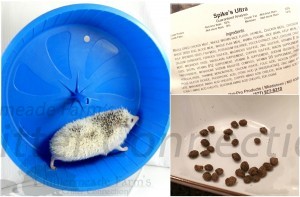Last Updated on October 29, 2022.

Overview
- Selecting a diet is one of the most important decisions you can make for your pet.
- This guide contains diet recommendations that are based on information we have gathered from other breeders (both large and small scale), nutrition experts, veterinarians, and other experts, as well as our own 15+ years of hedgehog breeding experience.
- Diet plays an important role in reproduction, growth of babies, the overall health of your pet, and in longevity. We have attempted to address basic hedgehog nutrition in our Nutrition Overview article.
- Our hedgehog diet has evolved over the years and will probably change in the future as we learn more and new products are developed.
- We have tried and tested just about every hedgehog specific food out there as well as many other breeder recommendations.There are several key components that will ultimately help you decide on the best choice of food for your hedgehog.
- We as owners have to educate ourselves so that we can make better choices for our pets since they do not get to decide what is best for themselves.
- Not all foods are created equal, but keep in mind the perfect food has not yet been determined.
Nutritional Content
- There are a lot of foods that have many of the same ingredients, but the amount of each ingredient as well as the quality will determine how “nutritious” the food is.
- Many breeders and hedgehog enthusiasts suggest when you read the label on a potential hedgehog food that at least one of the first three ingredients listed should be a quality protein such as chicken, turkey or some sort of meat.
Accessibility and Convenience.
- Once a food has been determined to be nutritionally fit it must be easily accessible to both the breeder and their customers. In addition, complicated diets present a problem from a breeder’s perspective and complicated diets are less likely for the average pet owner to follow over an extended period of time.
- Nutritional Value Compared to Cost
- Cost plays a part for both the average breeder and pet owner when selecting a diet.
- It is important that nutrition is not sacrificed for the sake of cutting expenses but it is only logical that breeders and pet owners choose the more economical versions of equivalent foods.
Follow Breeder Recommendations
- Whether purchasing from Millermeade Farms or from another breeder, it is important to follow the breeder’s recommendations for at least the first month of transition. A transition should be started right away only if the current diet is not nutritionally sound or if the hedgehog begins to develop problems.
- Countless times I personally have experienced and witnessed the results of switching foods and keeping animals on the same food. Some species of animals such as mice, rats, and hamsters transition quite well. Other species such as rabbits, sugar gliders and hedgehogs have a much trickier time in transition.
- Only buy quality animals and maintain that integrity. I firmly believe that different bloodlines become accustomed to certain diets and switching foods can create an imbalance in those animals. I have seen this play out in breeding and showing rabbits as well as countless other animals.
- Millermeade Farms no longer supplies a week’s worth of food with our animals. We have found that a week is not enough transition time to a new food. Purchasing food separately from the animals helps you to identify both the initial cost of your pet and recurring expenses you will have for the life of your pet. Our Transition Guide guide gives more details on this subject.
- I have found that variety is an important key to hedgehog nutrition. Variety is discussed below and in our Nutrition Overview.
Variety in Diet
- A varied diet is probably the safest way to meet a hedgehog’s unique and somewhat mysterious nutritional requirements.
- Providing a variety of foods will help to prevent your hedgehog from becoming attached to only one food. You could have a serious problem with your hedgehog not eating if your pet is attached to one food and that food becomes unavailable or you run out.
- Changes in diet are more easily made if only a portion of the varied diet is changed rather than an entire change in diet.
Unlimited Free Feeding vs. Daily Monitored Feeding
- I found just as many differences in opinions on this topic while doing research for this care guide as I have found with other topics.
- There are some people that firmly believe that hedgehogs should have food in front of them at all times and some believe hedgehogs will not overeat.
- Please note: baby hedgehogs, nursing moms, or slim body type hedgehogs should not be limited in the amount of food but at the same time their food intake should be monitored closely.
Advantages of Daily Monitored Feeding
- It is very common in many animal species to only be fed once per day but my own experience with feeding is contrary to the free-feeding belief. .
- Daily rationed feeding helps to prevent overeating, obesity, and the health problems associated with obesity. Most human diet plans are based on this same principle.
- We believe that monitoring your hedgehog’s food intake will keep your hedgehog from getting too fat.
- Obesity and its associated health disorders are very common problems in pet hedgehogs.
- Daily monitored feeding will let you know if it has stopped eating. If your hedgehog suddenly stops eating you need to find out why it isn’t eating.
- We prefer to give our fresh food rather than allowing some food to sit out for what may be a period of several days.
Appropriate Amount of Food
- We recommend that you give your adult hedgehog only enough food so that it is completely gone or almost gone at the same time the next day. You should give your hedgehog enough so that your hedgehog doesn’t act like it is starving at its next meal. This will be 1 Tablespoon to ¼ cup depending on your hedgehog (its metabolism, stage of growth and activity level) and the quality of food.
- If you feed your hedgehog in the evening and it acts hungry in the morning, give it a little more food but not so much that it has lots of food remaining in the evening.
- We prefer to feed our hedgehogs one portion, one time a day but some people prefer to feed two smaller portions each day.
- Your hedgehog will adjust to feeding at any time during the day or evening but it is important to be consistent in that you feed at the same time every day.
Food Storage
- Proper food storage is essential to keeping your food fresh. This protects not only the integrity of the food nutritionally but it helps to maintain the palatability of the food for your pet.
- We suggest purchasing a food storage container from your local dollar store or variety store. A good-sized container with a screw-top lid can usually be found for around a dollar.
- A portion of food can be kept in a sealed container close to your hedgehog’s cage for easy access. We suggest the remaining portion of the food be stored in a sealed container in the refrigerator.
- We also suggest taking a Sharpie or other permanent marker and writing the number of Pet-Pro Products, where you will order Spike’s Delite, on the lid of the container. The toll-free number is 1-877-977-8310. Don’t forget to tell them you are one of my customers to save 10%.
- Another suggestion is to start a food log on your container so you know how frequently you have to purchase food.
- Freezing extra portions of food is another option. The food should be tightly sealed, preferably with a vacuum sealer if possible. Be sure to move the food from the freezer to the refrigerator rather than directly to room temperature. Food moved directly to room temperature will develop condensation, which can cause spoilage.
- We have found that other pets such as cats and dogs also love the taste of Spike’s Delite and Select Diet. On several occasions customers have called in a panic because other pets devoured their hedgehog food. Storage containers are a great way to prevent this problem.
Diet and Exercise
- Exercise is another critical component to keeping your pet healthy and preventing obesity.
- Ample cage space, playtime, balls, and wheels are all ways to stimulate your pet and to encourage it to exercise.
- A healthy hedgehog is well muscled and not fat. A proper diet and frequent exercise help to build muscles and increase the longevity of your pet.
- Cages size, toys and accessories and playtime activities are discussed on several of our other guides.
Contributors: Gail Smith, Melissa Ramos





